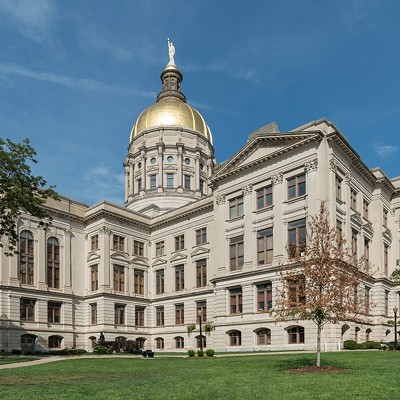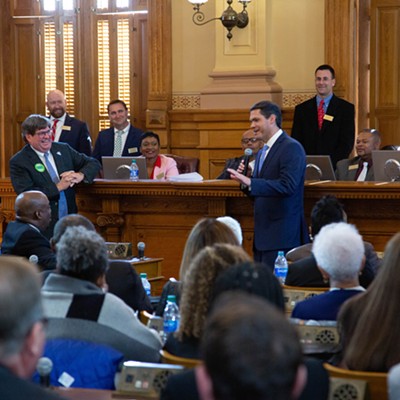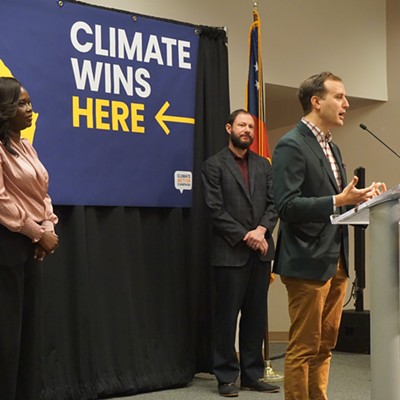This is the second part of a series investigating the financial and environmental implications of the Plant Vogtle expansion. The first part of the series discussed how federal tax dollars were being used to subsidize the development of the nuclear industry.
Beginning in January 2011, most Georgia Power customers will see an increase in their electric bill. It will start small, about $1.30 per month.
Over the next several years it will increase, until 2017, when residential and small business ratepayers are coughing up an additional $9.10 or more per month.
The money will be used to finance the construction of two new reactors at Plant Vogtle, the nuclear power facility outside Augusta. The collection of money now, for a project that won’t be done for the better part of a decade, if ever, is the law of the land in Georgia — at least if you’ve got friends like Georgia Power’s.
In April 2009, Gov. Sonny Perdue signed Senate Bill 31, also known as the Georgia Nuclear Financing Act, into law, mandating the collection of money for the new nuclear reactors.
When the State House of Representatives voted on the bill last February, John Sherman, President of the Fulton County Taxpayers Foundation (FCTF), was in attendance and was surprised by what he saw.
“In the passageway from the offices of the House members to the auditorium where they debate and vote. There were people crowding the passageway and they had to clear the middle so that these legislators could get in,” he recalls.
“The lobbyists had huge signs: ‘vote yes on SB31.’ I was standing next to one of them, and I said, ‘are you working for Georgia Power?’ and she said ‘Yes, all of us are.’ I counted 62 with buttons saying vote yes. The bill passed.”
Eight days later, after consulting with an attorney, Sherman and FCTF took action against the new law, and now they are one of several groups suing the governor and members of the Public Service Commission in an attempt to undo the legislation.
While it’s not out of the ordinary for utility companies to recover funds spent on everything from fuel cost to production development, what makes SB 31 peculiar is that according to Georgia law, it’s the responsibility of the Public Service Commission (PSC) to determine rate increases for regulated utilities, not the legislature.
“In the worst economy in a generation, Georgia Power asked the state legislature to put its stamp of approval on SB31, even though they knew the PSC was in the process of hearing from experts and deciding the matter,” explains Angela Speir Phelps, Executive Director of the consumer group Georgia Watch and a former PSC member.
The Nuclear Financing Act passed in the midst of the PSC’s review of Georgia Power’s request to collect funds in advance, also referred to as Construction Work in Progress (CWIP).
In its legal complaint, the FCTF argues that the passage of SB 31 prescribed the outcome of the PSC hearings, circumventing the usual regulatory process.
The group also argues that it violates the definition of “tax” according to the Georgia Constitution, which is “for the purpose of raising revenue to be used for public or government purposes,” rather than corporate gains.
Additionally, they find it egregiously unfair that members of two large industry groups, the Georgia Traditional Manufacturers Association (GTMA) and the Georgia Industrial Group (GIG), are exempt from the tariff.
Both GTMA and GIG had filed to argue against CWIP during the PSC case, but once their grievances were addressed through a legislated exemption, the groups withdrew from the other hearings.
That large business and special interest groups can find help under the gold dome is indicative of the political climate in Atlanta.
Although Georgia Power’s shareholders aren’t willing to expend any of the company’s funds on the construction of the new reactors (see part one of the series “Nuclear Bailout”), they are still willing to shell out cash to lawmakers at the state capitol.
The 62 sign-waving staffers that John Sherman saw standing in the halls of the capitol building on the day of the House vote were really just icing on the cake, the end of a lengthy and expensive lobbying campaign to ensure the passage of SB 31.
In 2008, lobbyists spent over $50,000 on behalf of Georgia Power, lavishing State Representatives and Senators — particularly those sitting on the Energy, Utility and Telecommunications Committee (EUTC) and the Committee on Regulated Industries and Utilities (CRIU) — with refreshments, hospitality suites, lunches, dinners, rounds of golf, and thousands of dollars worth of tickets to sports and cultural events.
In the first quarter of 2009, up through the governor signing the bill into law in April, lobbyists for the utility spent more than $15,000 garnering the support of legislators, including over $500 in hockey tickets for EUTC member Mark Burkhalter, and almost $200 in circus tickets for CRIU–member Jack Murphy. And those were just two out of several hundred gifts reported to the State Ethics Commission by the company’s lobbyists.
The staggering resources of Georgia Power and its parent Southern Company have helped overwhelm much of the opposition to the companies’ efforts, particularly with state officials.
“This is a David and Goliath struggle,” says Sara Barczak, part of the Southern Alliance for Clean Energy, another organization which has taken legal action against SB 31. “We have very limited resources in comparison to Southern Company. Our efforts on the congressional level are far, far less than what they are able to do.”
SB 31 passed both the state’s House and Senate with broad majorities before reaching the governor’s desk, and the bill is not without some merit.
Georgia Power has argued that the collection of money in advance to finance the project will save money for ratepayers in the long run, and at the end of last month, PSC staff analysis agreed with them, certifying that the CWIP would reduce costs for the ratepayer from $6.4 billion to $6.1 billion.
However, according to Public Interest Advocacy staff analysis, the new method will end up costing most ratepayers significantly more than it saves them. Most will not see any savings on their “investment” until 2027 at the earliest, and many not until 2077.
In previous projects, current customers avoided subsidizing costs for future customers by not paying for a utility project until after it was completed and operational. Recompense was spread across the life of a plant (usually 40–60 years) rather than paid upfront in five to ten years.
The issue with advance payment is that the legislation makes the assumption that the construction and operation of the new nuclear reactors is a foregone conclusion.
“They don’t have a firm date for when they’re going to get the construction and operating license approved because they don’t have a certified reactor design,” explains Barczak.
If the Plant Vogtle expansion is never completed, there is no mechanism in the legislation for the company to return the money.
Next week, find out why no one except Georgia Power is certain that they can guarantee the timeframe or budget for the construction of the nuclear reactors.





























